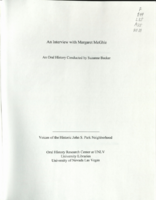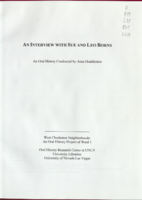Search the Special Collections and Archives Portal
Search Results

Transcript of interview with Francis E. Hughes by Mark E. French, February 23, 1977
Date
Archival Collection
Description
On February 23, 1977, collector Mark E. French interviewed local farmer, Francis E. Hughes (born March 9th, 1917 in Mesquite, Nevada) in his home in Mesquite, Nevada. This interview offers an overview of the general lifestyle and culture in Mesquite. Mr. Hughes mother, Orilla Leavitt, was born in Bunkerville, Nevada. Members of Mr. Hughes’s family were amongst the first settlers in the Mesquite area.
Text

Floyd Jenne interview, 1996: transcript
Date
Archival Collection
Description
Jenne discusses his birth in Ogden, Utah in 1915, his early life in Northern Nevada in 1920s, and his later life in Boulder City, Nevada working as a reclamation ranger for the Bureau of Reclamation. Jenne begins the interviews discussing his work as a steel foundry worker and miner in McGill, Nevada, studying forestry, and enlisting in the Civilian Conservation Corps at Utah State University in 1934. Jenne then describes his experiences moving to Boulder City and working as a reclamation ranger. Other topics Jenne covers include providing security for notable Boulder City and Hoover Dam (Boulder Dam) visitors and patrolling the area. Lastly, Jeanne talks about the Boulder City Junior Chamber of Commerce, Boulder City's incorporation, and Boulder City law enforcement.
Text

Transcript of interview with Mazie Martin Jones by Jane P. Kowalewski, November 3, 1978
Date
Archival Collection
Description
On November 3, 1978, Jane P. Kowalewski interviewed Mazie Martin Jones (born in Las Vegas, Nevada) about her father, Doctor Roy Martin, the first doctor to own a private practice in Las Vegas. Jones explains how her father first arrived in Nevada and his different investments in real estate, hospitals, and hotels. She goes on to explain her father’s hotel pursuits after retiring from medicine in the late forties.
Text

Transcript of interview with Phyllis Webb Clark by Lorna Suzette Clark, April 7, 1976
Date
Archival Collection
Description
On April 7, 1976, Lorna Suzette Clark interviewed her mother-in-law, Phyllis Webb Clark (born 1928 in Los Angeles, California) about her experiences from living in Las Vegas. The two first discuss education, the various address at which Phyllis lived, and the early development of the Strip and Downtown areas. The interview then covers the visits of important individuals, forms of transportation, the effect of World War II on the economy, and the effects of the growing town on hospitality and courteousness. Phyllis also mentions the Helldorado Parade, her involvement in Boy Scouts and Girl Scouts, and recreational activities. The interview concludes with a discussion on the atomic testing, the Stewart Ranch, and floods in Las Vegas.
Text

Transcript of interview with Ruth and Jake Dieleman by James M. Greene, November 15, 1974
Date
Archival Collection
Description
On November 15, 1974, James M. Greene interviewed Ruth Dieleman (born 1908 in Searchlight, Nevada) and her husband Jake Dieleman (born 1904 in Axel, Netherlands) about their lives in Southern Nevada. Ruth first talks about her life in Searchlight while growing up, her experience as an educator, and her various residences in Southern Nevada. Jake first talks about his immigration into the United States and his eventual move to Nevada to get into construction rigging for the building of Hoover Dam. He discusses his work as a rigger in detail but also discusses his work on various Las Vegas casinos as well as his work in the state legislature.
Text

Transcript of interview with Sam Earl by Laura Button, March 9, 1981
Date
Archival Collection
Description
On March 9, 1981, Laura Button interviewed Sam Earl (born 1912 in Virgin, Utah) about his life in Nevada. Also present during the interview is Sam’s wife, Melissa Earl. The three discuss a wide range of topics from the early development of Las Vegas, Sam’s work on the Boulder Dam, the Earls’ early residence in a tent, and the family’s religious participation. The interview also covers gambling, Block 16, the first members of the police force, recreational activities, and the Helldorado parade. Sam also talks about his work as a building contractor, including some of the buildings and casino properties he helped build, and the interview moves to a discussion of the development of the Las Vegas Strip. The interview concludes with Sam’s description of his work as a truck driver and a discussion on welfare benefits.
Text

Transcript of interview with Myoung-ja Lee Kwon by Claytee White, September 4, 2004
Date
Archival Collection
Description
Myoung-ja Lee Kwon began her life on the grounds of the Kyongbok Palace in Korea. In a country where education is valued, her father's occupation as a university professor meant that the family was highly honored, thus this palatial space allowed them live in a state of prosperity. But war changed these circumstances and in this interview Kwon vividly explains the family's evolution. In 1965, after graduation from Seoul National University she married and a year later, moved to the United State of America where she earned a Master's degree in Library Science in Provo, Utah. Her first professional position was at the University of Nevada Las Vegas as a cataloguer and after many promotions, became interim dean of UNLV Libraries. In 2001, she took the job as Dean of Libraries at California State East Bay Library, retiring in 2008. Currently, she serves as a special lecturer and discussion leader with the Fulbright Senior Specialist Program. During her 2009 visit to Korea, she pr
Text

Transcript of interview with Margaret McGhie by Suzanne Becker, November 21, 2008
Date
Archival Collection
Description
Margaret McGhie was a Depression era child who grew up in western Nevada, where her grandparents were ranchers. Her mother, a native Nevadan, married an Italian immigrant, and she recalls moving a lot. Margaret attended a business college in Reno and eventually moved to Las Vegas, where she worked for Basic Magnesium (BMI) in Gabbs, NV and then later for a remanufacturing company where she verified rocket measurements. Only 16,000 people resided in Las Vegas in post World War II days when she moved there for work as her husband returned from military service. At the time lots for homes were selling in the new development of John S. Park. Using the GI bill the young couple became one of the first home owners on the street. The land had formerly been a ranch and orchard making it a beautiful spot. Due to post-war building material shortages it took nearly two years to finish the house construction. To this day Margaret lives in the home where she and husband raised four children. She recalls the neighborhood fondly and describes some of the activities that kept them busy, where they shopped, and how her children attended John S. Park Elementary School and then the local parochial schools. She describes how the town changed from a 10-minute cross-town drive and how the fact of living close to the Strip had little impact on their life. People moved from the neighborhood as the city grew, she says, moving to newer and nicer homes in Spanish Oaks and then Summerlin. The John S. Park neighborhood has changed from a formerly large Mormon demographic to a notable increase of Latino population. She sees the historic designation as a signal of pride in ownership for residents.
Text

Transcript of interview with Leo Borns and Sue Easley Borns by Anna Huddleston, March 21, 2014
Date
Archival Collection
Description
Leo and Sue (Easley) Borns came to Las Vegas in 1962 to begin an architectural career that would last forty-four years in Southern Nevada. Leo Boms worked for various firms in Las Vegas before developing a reputation as "F. Borns, Architect". He has gone on to design buildings for state public works, Clark County, the City of Las Vegas, Clark County School District, churches, and private home owners. Rarely taking a job outside of Southern Nevada, Leo Boms' intent was to develop an architecture considered indigenous to the area while keeping the conservation of energy and technology as prime importance. Mr. and Mrs. Boms, after living in the area for approximately five years, decided to purchase a home on Strong Drive in McNeil Estates where they raised their three children. Active in social and philanthropic organizations, both Leo and Sue have become acquainted with numerous area personalities. Mr. Boms is most proud of being a part of the development of the Kiwanis Water Conservation Park although his structural designs can be seen throughout the Southern Nevada area. At the age of 77, he closed his office but remains an integral influence on the Greater Las Vegas area.
Text

Transcript of interview with Dennis Ortwein by Claytee White, May 6, 2009
Date
Archival Collection
Description
Dennis Ortwein arrived in Las Vegas in 1956. He shares many details about growing up in Montana, his parents and siblings, his education, and the moment in time when he was offered an opportunity to work in Las Vegas. He also lays out the path his singing career took, starting with school plays, duets with his sister, and high school quartets. Once in Las Vegas, Dennis taught for a while, served as principal, and was involved in creating programs that helped integrate schools. He also talks about his church choir work, entertainment in early Las Vegas, above-ground testing at the Nevada Test Site, and anti-nuclear protests. Dennis served as lab school and student teaching coordinator in Nigeria. He offers several anecdotes and stories about the time he and his family spent there. After retiring early (age 53), Dennis acted as consultant to the Esmeralda County school board, executive director for the National Conference of Christians and Jews, and wrote a book. He is currently enjoying his singing career by appearing at conventions, in musicals, and at weddings and memorials.
Text
